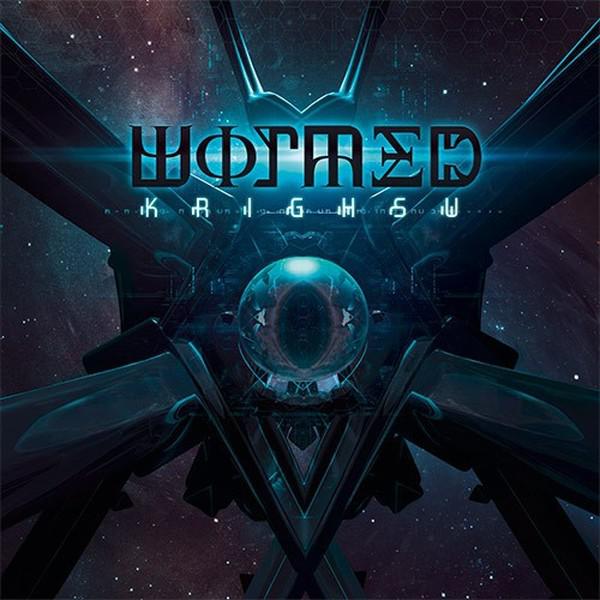For my 100th post I'd just like to declare my love for metal.
At this current moment in time I feel just as, if not more, excited than when I first properly delved into extreme metal about 4 years ago.
October has been a bloody brilliant month for metal releases. Sadly there are just too many bands, too many albums, and too little time to dedicate myself to all of them.
I'd really like to restart this little blogging platform and start posting on a more regular basis. Less formal shizz and more insane yet legible rantings. At first I wanted to create a legacy, like Ric Flair or Dusty Rhodes, now I'm happy to just ramble on like Festus of Eugene (a reference for all you wrestling fans out there (actually, I get no readers, this is literally just me)),
So this is going to be less structured and more rambling, but I'll throw up the odd in-depth and detailed review/article if something really manages to tickle my pickle. I'm going to be very busy until Christmas really, but I'll find the time. Discipline over motivation.
If anyone is here: Hello! I'm writing reviews for AngryMetalGuy currently, it's quite a bizarre feeling because I've always looked up to the site because of its professionalism and in-depth, fair, well-researched, and talented reviews written by people with an eye and an ear for the language as well as music.
All things are looking up - digitally and in the real world. Let's just wait for my next collapse, aye.
Friday 28 October 2016
Thursday 21 July 2016
Opeth - Still Life
For whatever reason I've never actually properly set down and listened to Opeth's fourth album. I'm not sure why I've never given it the time of the day, in fact for some reason I had instilled in myself the now completely-utterly-disgustingly wrong belief that the album wasn't actually that good: too winding/directionless, lacking the grand set-pieces and jaw-dropping moments of magic. I was more than pleasantly surprised when I sat down to listen to it on the long and warm journey from the south to the north, across 2 countries. The album is the perfect mix between the heavily atmospheric journeys of Morningrise and My Arms, Your Hearse and the epic standalone songs of Blackwater Park. I undestand the album is loosely a concept album, and I haven't focused on the lyrics at all yet, but the romantic undertones juxtaposed against Akerfeel's multi-dimensional growls is stunning.
Anyway, I leave you with a song from the album - 'Serenity Painted Death' - that never fails to excite, particularly the heavier sections that, through the power of squealing and spiralling string bends and groovy riffage aplenty, are impossible to not headbang too.
Monday 11 July 2016
BASSSS! Russian Circles - Geneva
This song is a pure force of post-rock/metal beauty. Russian Circles are the ultimate song builders. They manage to build layer after layer of stifling atmosphere like mastercraftsmen. The song somehow manages to move into godly territory with the deep and luscious cranking pulse of the bass at 2:22, it's really something special.
Sunday 10 July 2016
Barishi
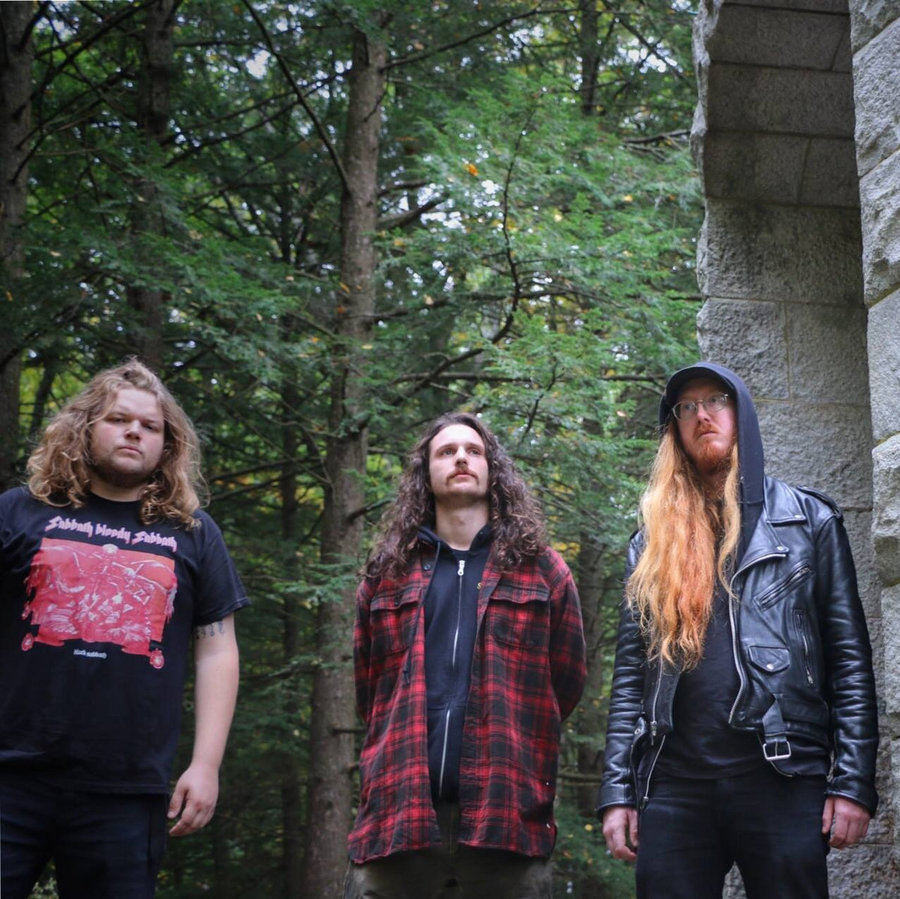
I found these guys on a list somewhere (not the sex-offenders register) and listened briefly to a few tracks. They are a crazy mix of The Mars Volta, Kraut, Fusion, Hail Spirit Noir and who knows what. Their album artwork is an apt representation of their sound. This is intriguing stuff. The song 'Exhibiche' opens like The Chili Peppers if their music actually sounded like an acid trip rather than a wet fart. I quite like some of the Chlli Pepper's stuff however, they just need to act their age, They're like those two kids from Bojack Horseman - Vincent Adultman. Shave that stupid moustache Anthony Kiedis. Flea put a t-shirt on. Anchorman on drums. etc. Anyway, this is nice, nice stuff.
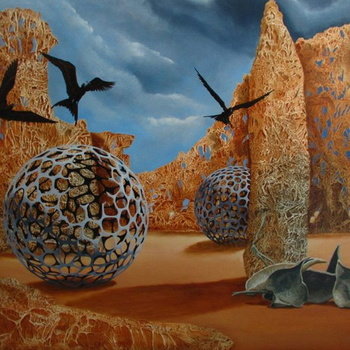
Saturday 9 July 2016
I'm (sort-of) writing for AngryMetalGuy
If I actually do have any resident readers here who cling to my every word like leeches on crack then you'll probably be wondering where I've disappeared to over the past few months. I've been nowhere, I was here all along. Basically, the AngryMetalGuy site were advertising positions for sort-of new writers. I'm on trial for my life, like a gormless idiot I'm scampering away under the weight of AngryMetalGuy's bureaucratic force trying to prove myself to the world. I feel like a Kafka protagonist, never knowing what powers control me. This is all a bit melodramatic, the experience of writing for a real (professional?) journalistic source is exciting. Just learning the basics - formatting, meeting deadlines/wordcounts, learning the vague housestyle - is striking, but there is still a lot of freedom involved. I've had one review published (Helleborus - The Carnal Sabbath - check this shit out) and I've just finished writing another, but I don't know when that will be published. Alongside all this internet tomfoolery I've finished university and am now a full-time member of this desperate and sad world. Metal is my crutch and weapon, so watch out Brexiteers, I'm coming for you.
Akerblogger is Back: Inter Arma - Paradise Gallows
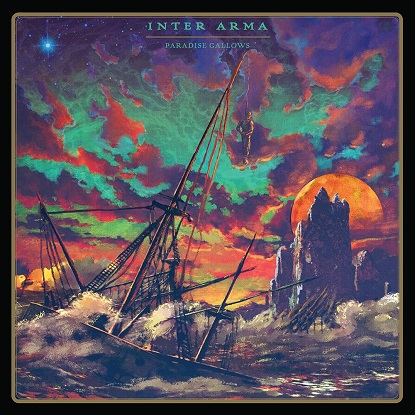
In an effort to revive this blogging I'm going to start randomly posting about things that I am quite literally listening to at this very moment. I'm mid way through the mega-goliath new album by Inter Arma and it is a truly incredible listening experience. This thing has everything: slams, sludge, cavernous death-doom vocals, Floydian (Pink, not Rick) psychedelic flourishings, soaring and completley overindulgent yet satisfying solos, prog-rock meets southern-twang noodling, expressive and clever drumwork, and satisfying pacing and strong structures. Each song has it's own dynamic footprint, each song works within the context of the album. There's a transition between 'Primordial Wound' and 'The Summer Drones', for example, that made me feel like I was soaring upwards into the cosmos, clouds billowing past me and blinding light glaring through the gaps in the sky. Very dramatic. But this is really, really impressive stuff - immersive and jaw-dropping. I feel rejuvenated on the metal side of things. Today I've found a lot of interesting new stuff; there really is just so much out there, it's overwhelming but its better than desperately picking stuff out of a barren selection of nothingness.
Thursday 31 March 2016
Brutal Super-Sonic Cataclysm: Wormed - Krighsu (2016)
Krighsu is the album I expected, and I expected a hugely brutal super-sonic cataclysmic cacophony or barely distinguishable vocals, inhuman drumming, irregular rhythms and weird deep-space ambiance. This album ticks all these boxes. Compared with their last album Exodromos, Krighsu feels more atmospheric and imaginative; the typically unforgiving instrumental sections are bookended by eerie ambiance and industrial sounding electronics. Occasionally these more eccentric moments breakthrough mid-song.
Most importantly, the crushing technicality is just as engrossing and powerful as expected - riffs chug along with the force of planets smashing together, the bass throngs and creaks with almost maniacal aggression and the drums are machine-like and incessant; most interesting is the moments between complete annihilation where unorthodox tenderness creeps in through int he form textured guitar lines and moments of respite. There are odd moments of harmony and softness, barely audible beneath the sonic maelstrom, that really gives the album an interesting dynamic. I personally love the vocals, they are tuneless, certainly inhuman - the sound of metal colliding with metal, a low grating whirl lacking any harmony; they're perfect for the album.
Wormed combine the ultra sterility of tech-death with the putrid barbarity of 90's brutal death and contemporary atmospheric death; Wormed manage to merge these seemingly opposing approaches with ease and the bands incredible musicianship allows for this. Krighsu is a heavy and intelligent album that satisfies my need for completely hopeless, crushing and challenging music.
Saturday 26 March 2016
Jadedness and rejuvenation: is there such a thing as too much metal?
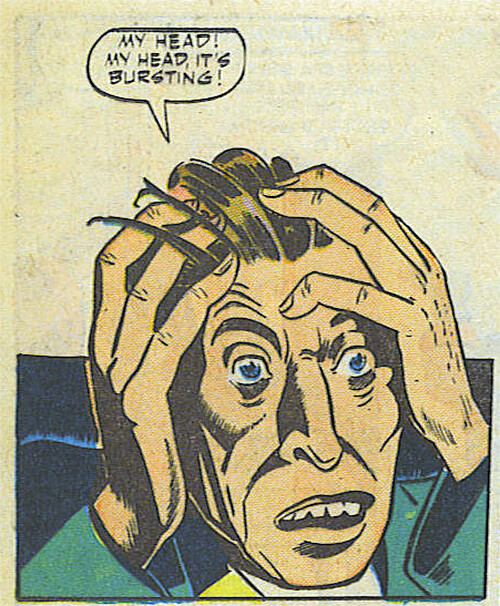
It's all been a bit quiet this week because this writing lark has all become a bit of a chore. I knew this day would come. It was inevitable, but I'm sure a spurt of writing passion will come again. I've partly been struck down with a music overload, an auditory avalanche that started at the very beginning and has finally cascaded over me and numbed me into apathy and jadedness.
I actually took a few days off from extreme-metal in general - that's completely blasphemous, perhaps even beyond comprehension, and I should be scorned and attacked. I think it's for the better actually; I've given myself a bit of a break and refreshed my mind and now I'm listening to stuff again and I feel a bit rejuvenated. Too much of one thing can deaden the impact and power it has over you and I think sometimes withdrawing oneself is needed. I've also had a short stint of minor man-flu which hasn't really helped motivate me, in fact I've been sort of sliming around the house like a anti-social malnourished vampire slug, cowering from bright light and human contact. In an even stranger run of events I've found myself listening to genres I've only touched upon very briefly before: trip-hop, downtempo, soul and hip-hop (Kendrick Lamar's To Pimp a Butterfly is a masterpiece of conscious rap, hip-hop, funk, jazz-fusion) - it's been a very diverse and interesting week of musical discovery and I have been exposed to some extremely interesting stuff from a cross-section of genres that are rather alien to metal - perhaps I've been possessed.
 But I found my way back to the gruesome house of metal and found the urge to delve into some of the grossest and most forlorn music to counteract the weird and wonderful journey I had taken in the days previous. The Ruins of Beverast and Leviathan are two solo-projects that are truly empowered by hatred, misanthropy and grit. Their music is a spiral into hopelessness, there really isn't much to cling onto with their music melody-wise. I listened to their most recent albums - Blood Vaults and Scar Sighted - two extremely engrossing and disturbing musical words, vast in scope and detailed in range of sounds. Both are dark ambient forces infused with slow and desperate elements of doom and soaring moments of sharp black-metal; it's the atmosphere, however, that creeps through the album like creeping fog, that really makes these albums, and these bands, great.
But I found my way back to the gruesome house of metal and found the urge to delve into some of the grossest and most forlorn music to counteract the weird and wonderful journey I had taken in the days previous. The Ruins of Beverast and Leviathan are two solo-projects that are truly empowered by hatred, misanthropy and grit. Their music is a spiral into hopelessness, there really isn't much to cling onto with their music melody-wise. I listened to their most recent albums - Blood Vaults and Scar Sighted - two extremely engrossing and disturbing musical words, vast in scope and detailed in range of sounds. Both are dark ambient forces infused with slow and desperate elements of doom and soaring moments of sharp black-metal; it's the atmosphere, however, that creeps through the album like creeping fog, that really makes these albums, and these bands, great. 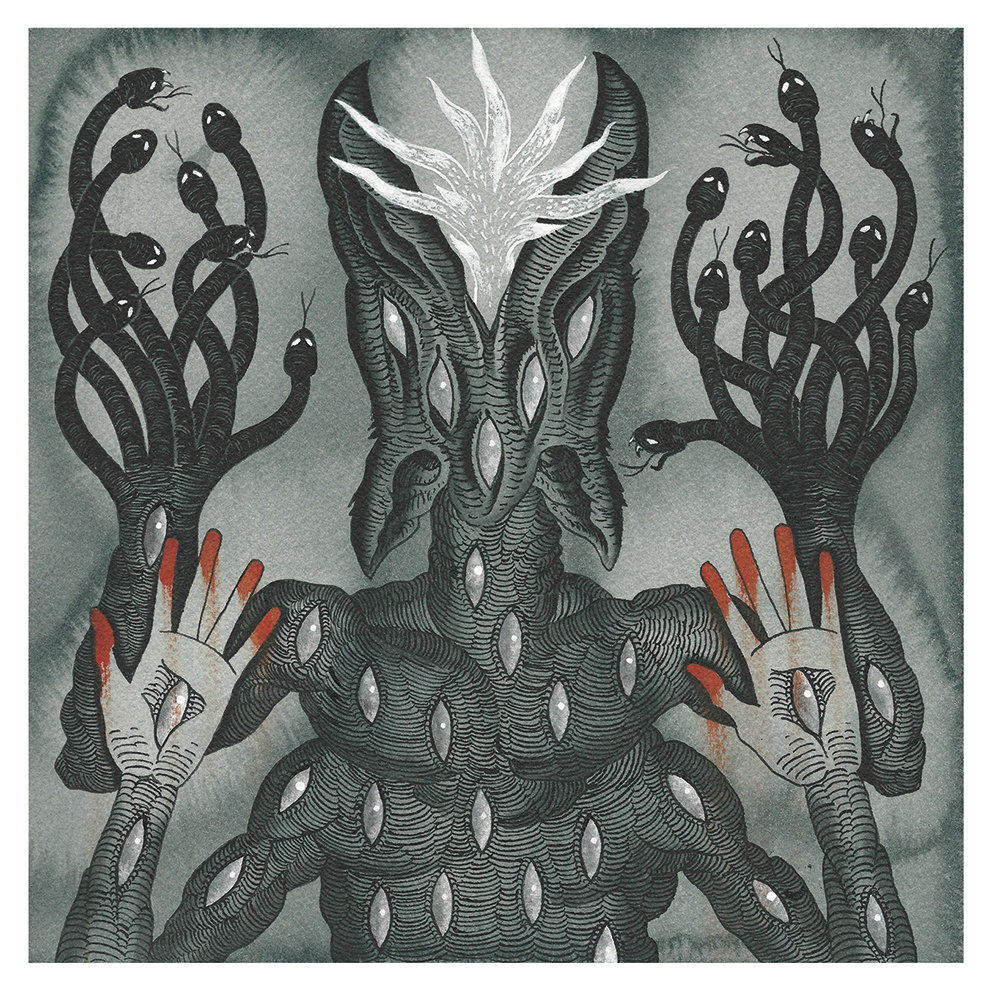 Atmosphere comes first here and it is controlled and utilized to intensify the proficient instrumental work, it's the glue that binds and without it you're stuck with a sterile and fragmented series of individual songs and moments that just sort of stagnates and jumps from one to the next, leaving a feeling of dissatisfaction. Albums need to flow and songs need to work together, speak to one another.
Atmosphere comes first here and it is controlled and utilized to intensify the proficient instrumental work, it's the glue that binds and without it you're stuck with a sterile and fragmented series of individual songs and moments that just sort of stagnates and jumps from one to the next, leaving a feeling of dissatisfaction. Albums need to flow and songs need to work together, speak to one another.
Demilich's Nespithe does this so very well - fragments of riff patterns from previous songs repeat throughout the album, sometimes exploding briefly then disappearing and at other times merging with other songs fluidly. The entire album is a variation of the riffs heard on the first song, and this never gets stale, partly because of the eccentricity of the riffs to start off with, and partly because of the entirely fucked-up alien-demonic universe that the band had created as a foundation to the music. I don't like it when a song just ends, or fades out, leading to silence, a five or ten second silence that leads to the next song.
To me some albums are just 8 or 10 or 12 songs just glued together. Some people like stand-alone songs, which is fine, but metal as a genre thrives because of the scope and the power of the album as a whole. It should be, in my opinion, 40-minutes of interconnected sounds, patterns, themes, riff-work, that subtly repeats and interweaves and flows organically and naturally. Unnatural attempts at connecting albums to make them seem more coherent are just as bad at times too; some bands try to bridge that silence between one song and the next by splicing in an out of place orchestral-strings interlude, or a somber piano piece, or a spoken-word piece talking of the cover-up of chemtrails, etc, etc. It shouldn't be forced. It should be carefully worked into the songs and into the period between songs. This is what The Ruins of Beverast and Leviathan do well.
If you have got this far, thank you for reading this jumbled and chaotic mess of thoughts and feelings and I hope to have more frequent posts up in the near future.
If you have got this far, thank you for reading this jumbled and chaotic mess of thoughts and feelings and I hope to have more frequent posts up in the near future.
Monday 21 March 2016
Fuzzgump the Second
Vanessa Van Basten sounds Dutch, I haven't checked and I don't really care. She may or may not be related to the famous footballer, but I also don't care about checking that, either. She may or may not be one thing or another. I also thought that she was a classical singer - she is not. In fact listening to her/it/them makes me question the very fundamentals of my existence. On the 18th of February Mr. Fuzzgump added Vanessa Van Basten as a playlist on Spotify, he returned today to find the playlist, but he was baffled by how and why Vanessa taints his playlists. He decided to listen, expecting a light and airy fairy twinkly twangly light and feathery indie tingle wingle sound but was greeted with an unexpected dark and heavy fuzzy wuzzy doomy gloomy sound infused with a dissonant industrial sound that shocked and impressed Fuzzgump so much that he wanted me to share this with you: It's a song by Vanessa Van Basten. The riffs are fuzzy. The artwork is fuzzy in a different way - obscure, indistinct, vague, absurd and surreal in a very pleasing way.
Note: Fuzzgump doesn't care for biography or history or truth. The only truth is in the fuzz, the fuzz is coats world with its suffocating essence.
The First Fuzzgump
The first of Mr. Fuzzgump's fuzzy funderments. All that dwells here will be fuzzy, distorted, hazy, crazy, lazy, lo-fi, downright shady, blurred, obscured, disturbed, contorted, confused, muddled, befuddled, obscene, extreme. Fuzz is love, fuzz is life - fuzz obscures the sharp realities of high definition existence. I am Mr. Fuzzgump's spokesman: Fuzz has fuzzed his ability to speak...and type. The band above are Fuzz, a side-project of Ty Segall who I thought had died but realised I was mixing him up with Jay Reatard. He's quite fuzzy too. Fuzz is pretty generic every day fuzz, sort of lazy and nasally but fun. It opens like Sabbath before getting all folky-polkly like Zeppelin but then it becomes a bit more stoner-fied and nasally and dirty and fuzzy.
Saturday 19 March 2016
Claustrophobic and Devouring: Altarage - Nihl (2016)
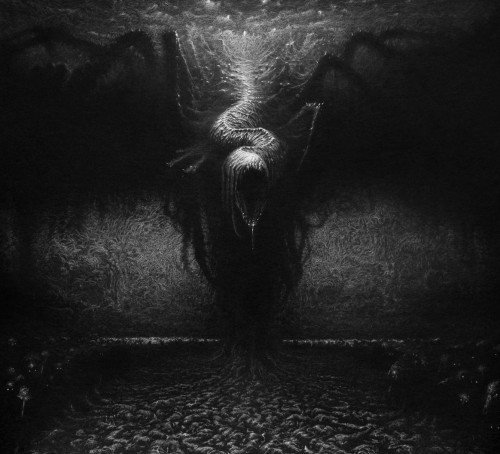 |
| Facebook: https://www.facebook.com/ALTARAGE/?fref=nf Bandcamp: http://altarage.bandcamp.com/ |
NIHL, the debut album by Spain's Altarage, is an overwhelming and all-consuming force of dense matter that completely drains all colour and life. The vocals are a hazy and grating, a vibrating shape-shifting monster that crawls from the deep and devours life - I imagine it's the noise that the shadowy and creeping arachnid-demon creature in the fantastic album artwork would make.
The entire thing, from the band logo to the artwork to the song-titles to the most important aspect - the music itself - is dripping in a claustrophobic and oppressive atmosphere; the production here is full and bass-heavy and the rumbling of the drums and the grating vocals are an incessant attack on the senses - the album succeeds in stunning the listener into submission. I'd attribute this partly to the diverse drum-work: they close 'Baptism Nihl' with a ritualistic pounding; similarly in creeping atmosphere of 'Batherex' they rumble with a demonic steadiness; towards the middle and end of 'Vortex Pyramid', as the song breaks down into further instability and chaos, the supersonic drum-work is frantic, almost inhuman, and at 3.45 breaks in to a jazz-like death-metal drum solo.
NIHL is a gem riff-wise too: heavy chugs merge with creaking dissonance, laser-sharp stabbings of coldness merge with reverberating atmospheres and old-school mid-paced grooves merge with intense spurts of brutal-death skull-crushery - it's all very well done. At 36-minutes NIHL is the perfect length for an album of such intensity; not too short - leaving dissatisfaction - but not at all dragging on, becoming stale. The album ends leaving me, at least, craving more brain-sapping and skull-crushing intensity which, at a most simple level, is the sign of a captivating album.
Thursday 17 March 2016
Alphabetical Discovery - Week F, Day Two: A Forest of Stars
Carrying the essence of Victorian occult beliefs, superstitions and squalor, A Forest of Stars traveled backward and then forward in time to unleash their distinctive approach to extreme metal; theirs is a theatrical mix of black-metal, psychedelic, 70's-esque prog-rock, and classical, though pinpointing their sound is ultimately proves futile and dissatisfying. Nothing really comes close to matching the inherent English morbidness of their sound - tortured vocalist Mister Curse croaks, croons and delivers his vocals in a vernacular straight from the streets of Victorian England, a stage-magician terrifying superstitious crowds. With seven members and the regular use of pianofortes, peculiar percussion, violins, and flutes, A Forest of Star's sound is grand - a swirling incantation of subtle and beautiful melodies and folk sections that lure a listener in counteracted by the gritty and sordid. At its foundation their black-metal approach is very well-done, take 'Blaze of Hammers' from their most recent fourth album Beware The Sword You Cannot See as an example of the evil and unforgiving intensities that snarl through their miserably beautufk sound - they never forget their roots; twinned to their black-metal is a death-obsessed, vitriolic and melancholic approach to album concepts and lyrics. Their lyrics carry the music as much as the instrumentals themselves, they are extremely imaginative and, matched with the idiosyncratic vocal delivery, they create a truly unique atmosphere unlike anything I've really listened to before.
The accused are great in number,
though if you'd kind enough to line them up,
I could find it in me to fire the shots.
Temples holed by misplaced homily.
Nails all lined up to support heads lording over spikes of infamy.
Your alter-ego can dig the pit.
Then, once it's lined with silent bones,
we can stir the ghosts around.
Perhaps take their powder as salve.
Though it'll perish your thoughts, I'll tell you.
Curiosity pushed you in, face first on top of all the others.
So let's roll the old worm ball down another cerebral hill,
Bone over wire / racing the funeral pyre.
('Virtus Sola Invicta')
Tuesday 15 March 2016
Alphabetical Discovery - Week F, Day One: Falls of Rauros
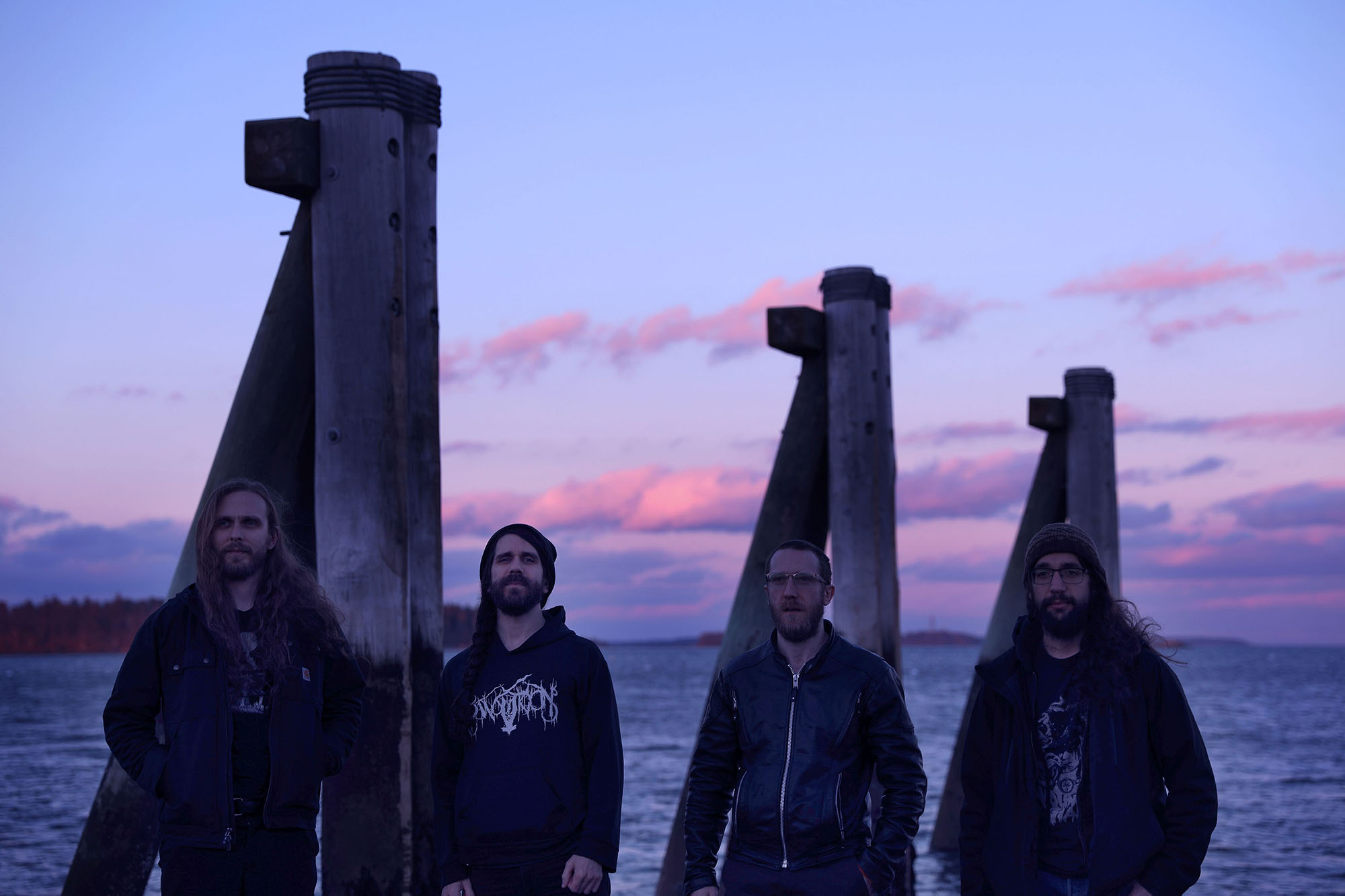 |
| Facebook: https://www.facebook.com/Falls-of-Rauros-197095916993311/ Bandcamp: http://fallsofrauros.bandcamp.com/ |
Note: This was supposed to be posted yesterday: Monday the 14th. So just imagine it's a Monday and all will be fine.
Rising dawn forces creeping shadow into hiding; the sound of the ocean laps, swallows, pulls at desolate shorelines; an ethereal echo harmonises with a wide-arching wind over vast landscapes: this is the sound of Portland, Maine's Falls of Rauros. Vulnerable and wispy, dreamy and raw, the band belong to a scene that passionately merges elements of folk and black-metal with deep layers of melody and sensitivity. The band have a melodic and exploratory guitar-lead sound: lines of piercing and soaring melody intertwine, smoke, and drift above echoed gazing vocals. The guitar work in the bands third full-length - 2014's Believe In No Coming Shore - is a snaking work of art, spiraling and moving throughout the 42-minutes with a magical quality. It's not typically black-metal, although that label has been attributed to the band - they're much more tender, pensive and less-aggressive; there are certainly moments where songs reach a crescendo, where drums, bass, guitars and vocals bubble and steam, but as a whole their sound flows through channels of poignant melancholy and reflection. The majority is instrumental too, vocals rise from the mix occasionally but for the most part it's the exploratory folk-etched sound that takes command. It's a very honest and beautiful sound.
Sunday 13 March 2016
An All-Consuming Dismal Mire: Inverloch - Distance | Collapsed (2016)
 |
| Facebook: https://www.facebook.com/InverlochOfficial/?fref=ts Bandcamp: http://inverloch.bandcamp.com/ |
Gathering and reshaping the mucoid toxins of 90's death-doom druids Disembowelment, drummer Paul Maziotta and guitarist Matthew Skarajew merged Voidchrist bassist Chris Jordon, vocalist Ben James and Guitarist Mark Cullen to form Inverloch - a chest-crushingly heavy band integrating the suffocating atmospheres of funeral-doom and the oppressiveness of ungodly death-metal. It's a dragging album, one that hooks into the ear-drums and slowly pulls the listener down into a dismal mire.
Distance | Collapsed opens with the the eight-minute plus 'Distance Collapsed (In Rubble)', a fittingly all-consuming Goliath of an opening track that moves from a lead-heavy and pummeling old-school death opening to a thick and atmospheric closing, tinged with melody and melancholy. The vocals are deep, gargled and prolonged, reaching through the murky heaviness like a sulfurous cloud. There is such a depth to the album's sound. It's crushingly heavy - each chug and each crash reverberates with the force of entire forests toppling to the ground, bringing buildings to the ground, rumbling with a eerie constancy. Yet the album transitions to something more brooding with 'From the Eventide Pool'.
 There is a certain dreamlike melodic quality to the lead guitar that flutters above the crushing barbarism of the rumbled vocals and the crunching riffs; it's rather tender and beautiful in a perverse and unsettling way. This is an album of juxtapositions, however, and 'Lucid Delirium' writhes into paranoid existence - a song rid of tenderness and humanity. It's a crunching assault of cavernous death-metal, a song that demonstrates the truly demonic side to Inverloch; even less accessible than the first track, 'Lucid Delirium' is a cascading force of grating, almost monotone, doom-death - slower and toneless, into the abyss deeper we're dragged. 'The Empyrean Torment' is similarly dense; seven-minutes of steady mortar-fire like drums, ice-cold growls like wind through desolate fields and somber riff progressions collapses into a passage of more unforgiving intensity. It ends with 'Cataclysm of Lacuna' that carries on the from the last but with a solitary and somber lead resonating like a funeral-song above the collapse.
There is a certain dreamlike melodic quality to the lead guitar that flutters above the crushing barbarism of the rumbled vocals and the crunching riffs; it's rather tender and beautiful in a perverse and unsettling way. This is an album of juxtapositions, however, and 'Lucid Delirium' writhes into paranoid existence - a song rid of tenderness and humanity. It's a crunching assault of cavernous death-metal, a song that demonstrates the truly demonic side to Inverloch; even less accessible than the first track, 'Lucid Delirium' is a cascading force of grating, almost monotone, doom-death - slower and toneless, into the abyss deeper we're dragged. 'The Empyrean Torment' is similarly dense; seven-minutes of steady mortar-fire like drums, ice-cold growls like wind through desolate fields and somber riff progressions collapses into a passage of more unforgiving intensity. It ends with 'Cataclysm of Lacuna' that carries on the from the last but with a solitary and somber lead resonating like a funeral-song above the collapse.This is a genuinely dense and heavy album that shows that incessant and grating noise and violence is not always the best at creating atmosphere; Inverloch manage to balance elements of tenderness and heaviness, channeling them as one through cleverly thought out song progressions. Many bands attempt to smother their listeners into a tormented state of despair but only a handful genuinely succeed: Celtic Frost, Triptykon, Vallenfyre, Anaal Nathrakh, Wormed, Indian, and Darkspace are those, in my opinion, who have really succeeded in creating absolutely soul-destroying atmospheres in the past few years: Inverloch are now added to that list.
Friday 11 March 2016
Alphabetical Discovery - Week E, Day Seven: Esoteric
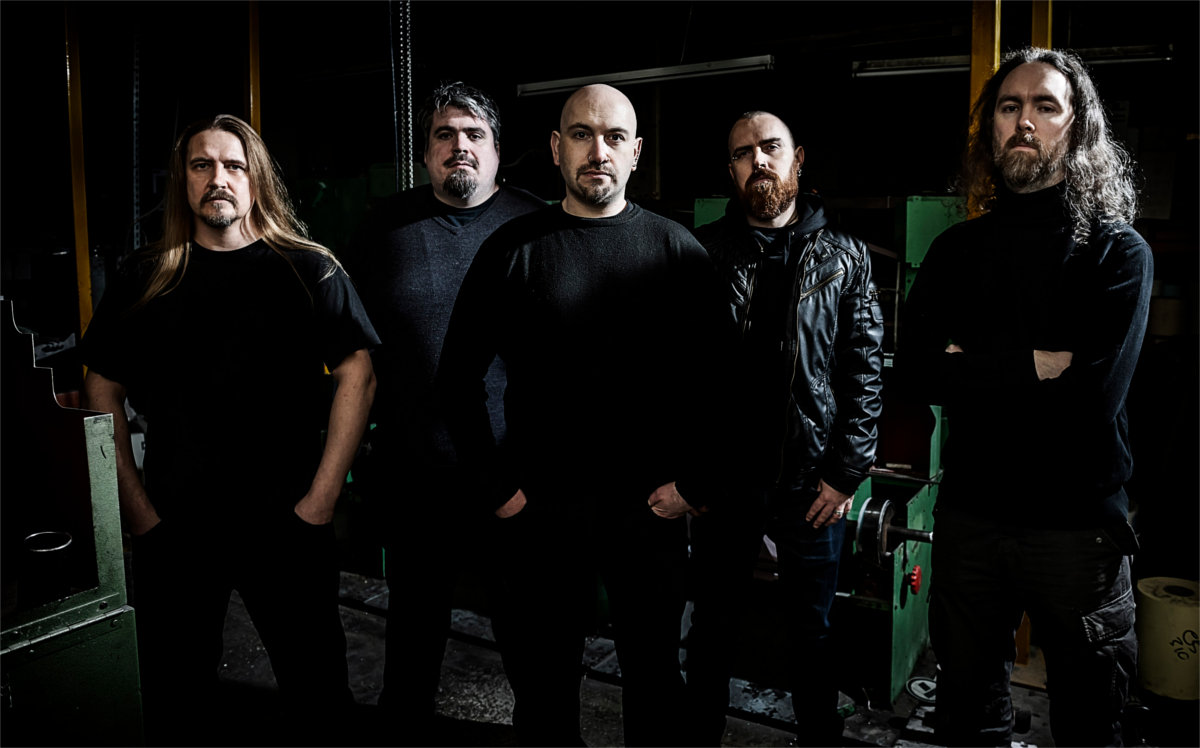
For those who like their music long and winding, brooding and serious, mystical and spiritual, varied and eclectic, crushingly dreary and poignantly wispy listen to Esoteric. The British band are a glowing obelisk in the funeral-doom landscape; formed in 1992 they have released six full-lengths, each consistently transfixing and beautiful. Their sound, particularly on their two most recent albums - 2008's The Maniacal Vale and 2011's Paragon of Dissonance - are vastly more melodic than your usual melancholic dirge-like approach to funeral-doom. They, whoever they are, say that funerals should be a celebration of life, albeit a solemn one, and perhaps this rings true with Esoteric - but not strongly I should add. A tenderness runs through their songs - guitar leads explore the solemn soundscapes with an imaginative freedom, careering off the typically dense vocals, slamming, steady drum-work and throbbing bass lines. Their sound is, I suppose, progressive - songs often fizzle from their composed starting points, rooted in a traditional doom sound, into something more cosmic, frenzied and, well, esoteric. Keyboards and ambient sounds, changes in tempo, vocal acrobatics - low growls switch to mid-ranged grunts to higher shrieks - and riffs progressions all merge merely to unravel with an exploratory psychedelic freedom, it all comes together to form a burning ball of funeral-doom energy that builds only to burst and seep like a dying star. Their lyrics reflect the music, touching on human states of misanthropy, isolation and existential worry and the more cosmic concerns of infinite space and the dream-state. Esoteric have a very interesting and truly, in the truest sense of the word - truly - epic sound that captures the imagination expertly.
Note: Starting tomorrow - with the beginning of Week F - I will be posting a discovery post every other day rather than every day. I'm doing this because I'd like to give myself some more time to review new albums and post new content. Stopping things getting stale and giving myself a bit more breathing space.
Thursday 10 March 2016
Alphabetical Discovery - Week E, Day Six: Eagle Twin
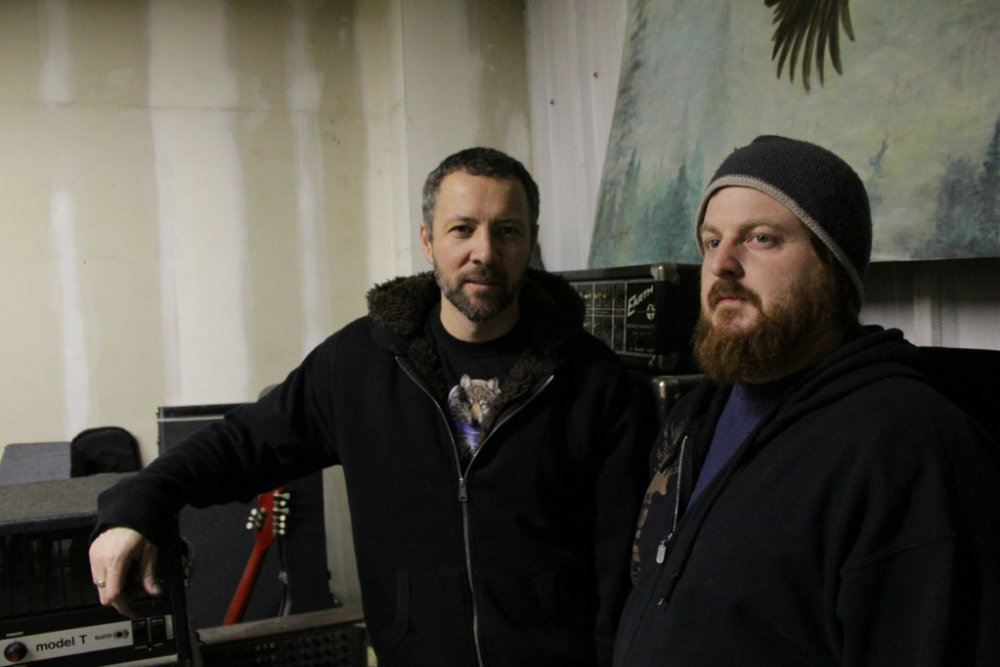
Eagle Twin are a peculiar, vaguely experiment, doom-sludge hybrid; they have a classic doom sound tainted by elements of depressive and nihilistic fuzz and grot. Their two-man sound is a flecked with a dirtiness that reaches its grubby fingers through expansive and imaginative vistas. 2009's The Unkindness of Crows is partly based on poet Ted Hughes's semi-completed collection Crow - a desolate, cryptic and mythical series of poems about man's disregard, and subsequent self-corruption, for nature. The crows are symbols of death and hopelessness, manifestations of dread and damnation and a violent and unforgiving natural world - it's a perfect thing to write a dreary doom-record about. Lyrically abstract the music follows similarly dense and unforgiving paths - throbbing, tribal, primal, unrestrained and a bit mad, Eagle Twin's vocalist Gentry Densley (stunning name) sounds like a disheveled hermit moaning into the starry night with feces smothered over his body and with twigs and small animals protruding from his mottled hair. Their sound is quite unruly and dissonant, it tries not to be clean or fluid or easy on the ears: it's rough and dirty - it's how this sort of earthy doom-sludge should sound. Songs do pick up and build to a crescendo of headbangable bluesy-riffs - nothing too extravagant or technical, but fitting and powerful. 2012's The Feather Tipped The Serpent's Feather is a similarly dense allegorical journey through the eyes of the a predator snake - once again dirty and vast and thematically very interesting. Eagle Twin have that gritty Southern-USA folk swamp sound down to perfection. If you want something smelly and dirty with interesting album concepts and a well-done to rare doom-sound these are your guys.
Wednesday 9 March 2016
Alphabetical Discovery - Week E, Day Five: Earth

Earth - led by the stone-face, grizzled, mutton-chopped, biker-cowboy pioneer Dylan Carson - are a true force to behold. Coming out of the same state at the same time as the meddlesome grunge pioneers, Earth chose to trek through the hazy and barren deserts of instrumental drone, psychedelia, doom and post-rock rather than rampaging through the gritty cities of Washington wearing baggy checkered shirts and jeans.
Earth's sound on their first album - 1993's Earth 2 - Special Low Frequency Version - is about as inaccessible as music can get: dense and buzzing, incessantly grating with croaking feedback and crackling lo-fi production, it's the sound of a nuclear reactor breaking down dying, or the buzz of a trillion bees slowly dying. There are sort of riffs but they warp through the mix like something about to die, gasping for breath, letting out a dying cry. It's three songs at an hour and thirteen-minutes and it's difficult to focus on its monotony, yet its sound defied it's inaccessibility, proving to be a huge influence on the drone-doom sounds off Sun O)) and the influx of similar bands in the years to come.
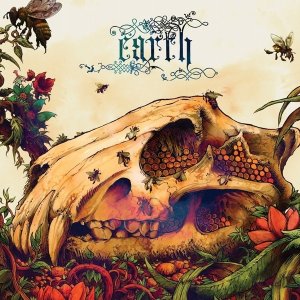
Their second album - 1993's Phase 3 - Thrones and Dominions - picks up the pace, revealing a slow-to-medium paced sparsity touched with combines drone and ambient with elements of garagey-blues and country. But the dominant overdrive and crackling lo-fi feedback remained to dirty and taint any clarity and cleanness. This album demonstrated the band's more tender sound - the soft drum-work and occasionally beautiful guitar-work demonstrated a diversity that would be utilised to cinematic proportions on their later albums.
1996's Pentastar was a more accessible change in sound - less gritty but still with a bite, the album explored a groovier mid-paced desert-rock vibe; it's the sound of steaming off into the sunset in some overly-large and overly-loud truck with the window down, sunglasses on, elbow poking out of the open window with a look of calm defiance on your face. These more conventional elements are pretty chill. Dispersed between these 'cool' moments are more melancholy ambient songs like 'Sonar and Depth Change', a sparse seven-minutes consisting of two-piano notes repeated - echoing and slightly out of tune; in writing it sounds terrible, but it really seems to muster an uneasy feeling.
The band broke up in 1997 but returned in 2005 with Hex; Or Printing The Infernal Method. Their new sound consisted of (Metal-Archive puts it better than I could) 'a minimalist, meditative doom with gospel and country influences'. Their sound from this album onward is truly mesmeric and each album binds a listener into its dynamic world with cinematic brilliance. The atmosphere on Hex - based on Blood Meridian by Cormac McCarthy - is a tense and chilling western soundtrack that floats through the deserts with a dreamy and heavy doom-inspired evilness. The songs are steady and creeping and the guitar progressions are really something to behold. 2008's The Bee's Made Honey In The Lion's Skull is a continuation of the sound explored on Hex, and it is perhaps my favourite; warmer in composition with stronger melodies, the album includesaccompanying pianos and keyboards that paint this rich and glorious journey.
I haven't delved in to the two-album partnership of Angels of Darkness I and II yet, but I'm sure they are very good; I've listened to bits and pieces - their sound hasn't change drastically at all: the band are yet to move in to their techno phase. 2014's Primitive and Deadly, their most recent full-length, is a slightly more intense and dark record when compared with The Bee's, but it also picks up the pace delving into more blusey-doom guitar soloing and faster-paced rhythms. It also features excellent vocals from Mark Lanegan of The Screaming Trees fame and Rabia Shaheen Qazi. There's not much more I can say: Earth are truly one of a kind with a distinctive, mesmeric and unmatched immersive sound.
Tuesday 8 March 2016
Alphabetical Discovery - Week E, Day Four: Entropia
 |
| Facebook: https://www.facebook.com/mourningentropia/?fref=ts Bandcamp: https://entropia.bandcamp.com/album/ufonaut |
Formed in Poland in 2007, and with two albums under their belt - 2013's Vesper and 2016's Ufonaut -Entropia combine eclectic sounding psychedelia and progressive-metal rooted in a black-metal sound akin to that of Oranssi Pazuzu. I'm going to kill two birds with one stone here by combining this with a discussion of their new album, Ufonaut, released on the 15th of February.
The album begins with 'Fractal', a throbbing beast of a song that steams ahead with fury from the get-go. Riff-work is angular and fast-paced as shouted and muffled vocals - Neurosis-esque - grate in the background. As the song develops the vocals transform into a more conventional black-metal howl and swirling siren sounds trip through the mix but the song grows colder, more inherently black-metal, and more traditionally evil sounding as chiming ambiance, relentless drumming and cranking-bass work creeps to the fore. (The bass-work throughout the album is mesmeric - take 'Apogeum', the fourth track, as an example, where it pulsates and throbs with a mesmeric quality through the mix: its full and confrontational sound is a real binding force in this album.) But, in what is expected for this album, nothing is permanent - ideas and sounds morph and change rapidly and without warning.
'Samsara' opens in a similarly relentless fashion with haunting atmospheric undertones filtering through. The production is crushing - the bass is loud in the mix, every vibration is felt, the drums are equally unforgiving, but the vocals are less pronounced, more of a accompaniment, although this is no issue at all as the instrumentals are constantly interesting. Most important, despite the diverse range of sounds and progressions, is the riffs, and there really is an endless conveyor belt of interesting and varied riffs packed in Ufonaut's 43-minutes.
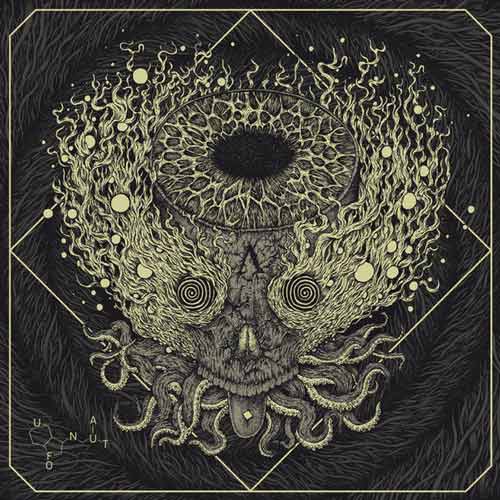 Spiraling and sprawling, vibrant and visceral, the album does not lose sight of the black-metal sound that gives it its punch; the psychedelic and ambient touches enhance the ethereal sound. 'Ufonaut', the third track, combines a sludgey post-metal with whiplashes of black-metal that clings to the foundation like a snake. Up to this point Ufonaut has been incessant - there's no space to breathe among the swathe of sounds, riff-changes, tempo-changes and all-round aggression. In fact, a lot of the keyboard and sample work reminds me a lot of the extravagant sounds in Leprous's Bilateral, although Entropia have channeled it through a much more violent machine. The entire thing is richly layered and textured, nothing has been included without much deliberation and care.
Spiraling and sprawling, vibrant and visceral, the album does not lose sight of the black-metal sound that gives it its punch; the psychedelic and ambient touches enhance the ethereal sound. 'Ufonaut', the third track, combines a sludgey post-metal with whiplashes of black-metal that clings to the foundation like a snake. Up to this point Ufonaut has been incessant - there's no space to breathe among the swathe of sounds, riff-changes, tempo-changes and all-round aggression. In fact, a lot of the keyboard and sample work reminds me a lot of the extravagant sounds in Leprous's Bilateral, although Entropia have channeled it through a much more violent machine. The entire thing is richly layered and textured, nothing has been included without much deliberation and care.
The fifth track - 'Mandala' - brings in a more viscous post-metal chug-heavy sound layered beneath echoing and bleeping keyboards. The black-metal tremolo-riffing and dissonance soon rises from the depths with a sharp attack of high-pitched single-note speed; this leads to an echoing sample and futuristic space-like reverberations before slowing, still quite fast by the album's standards, to a medium-paced doom groove. The drum's are unforgiving throughout, constantly steam-rolling ahead without a care in the world - occasionally I feel that they could be more nuanced.
Industrial-ambient noises clang through 'Paradox' as the sound of what seems like metal pipes collides sharply with a more depressive and ponderous sounding post-black metal sound in the vein Panopticon and Wildernessking (of which you can check the review here (shameless plug).) This solemn and reflective sound works its way into the final track 'Veritas'; hazy and melodic, the song throws up an epic angular riff section at 3.25 alongside gradually quickening double-bass drumming before descending, or ascending, back to where the album began - with a throttling black-metal sound merged with quirky atmospheric and ambient elements.
The album has surprised me for the better. I was expecting a much sparser, long-winded, repetitive and mesmeric approach - something with interesting sounds but lacking an edge and a drive; this album is intense and mesmeric, it manages to combine these two approaches very well. It is an impressive album, with much replay-ability, that does not release a listener from its grasp for one-second.
Monday 7 March 2016
Alphabetical Discovery - Week E, Day Three: Enslaved
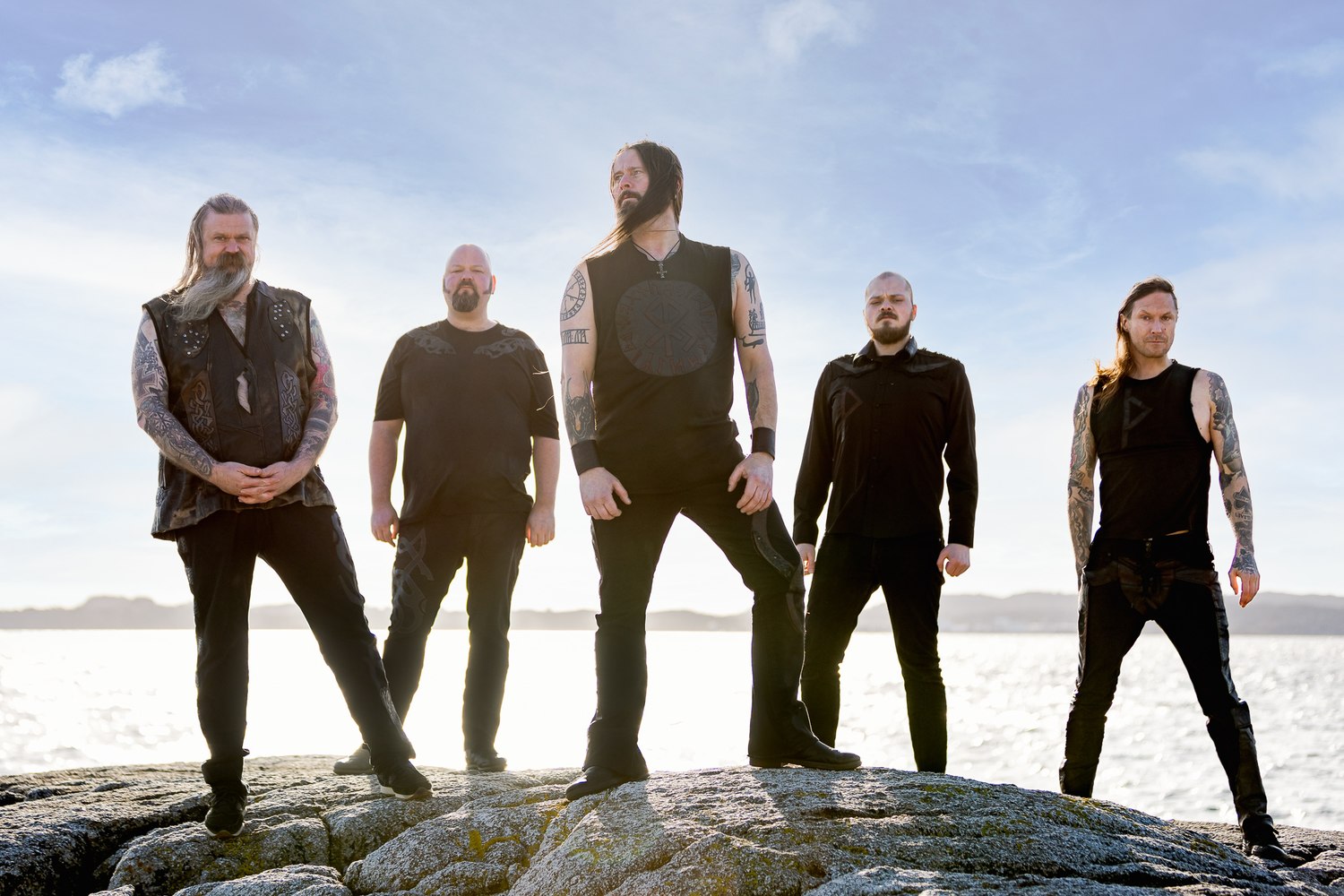
This is going to be completely biased and over-the-top because Enslaved are one of my favourite bands. Enslaved were formed by bassist and vocalist Grutle Kjellson and and guitarist Ivar Bjørnson in 1991 - twenty-five years later they're still leading the way, spearheading the sound on thirteen full-lengths that morphed and developed with an unmatched proficiency and imaginative touch: from the conventional rawness of their split with Emperor to their viking-black approach in the 90's; from the dense and heavy Mardraum in 2000 to the cryptic and experimental Monumension in 2001; from then on - starting with 2003's Below The Lights - Enslaved began merging a rich and textured progressive sound with their intense black-metal roots. With the recruitment of vocalist, keyboardist and all-round shapeshifter Herbrand Larsen on 2004's Isa, Enslaved stretched their viking-limbs through untapped territories; the inclusion of Larsen's clean vocals and epic keyboard work lifted Enslaved into awe-inspiring musical realms that few bands come close to reaching.
To make a bold statement: Enslaved are like an extreme-metal version of Pink Floyd. Pink Floyd's earlier folky-psyhedelic days made way for the timeless expansiveness of their 70's output; for Enslaved their folky-viking sound made way for the timeless expansiveness of the 2000's output. But with Enslaved the wheels haven't stuck - their engine is still buzzing with the same energy that thirteen-year old Grutle Kjellson had when he first formed the band in 1991. They still try to best the record that came before - a difficult yet capable quest for the band - and this has formed them into a band with a truly consistent and diverse discography. The band have had their fingers in all the extreme, and non-extreme, pies and the combination of tastes is delicious (that was awful, I'm so sorry.)
It will take an eternity to talk through the nuances of each album - that's a task for another day. I'll talk of some songs that I think demonstrate the grandeur of the band. 'Eld', from Eld, is a fiery inferno of ancient viking worship; initially the song burns with a straight-forward and riff-tastic black-metal sound before slowing to a heroic and heraldic mid-paced section stirring with keyboard ambiance and clean-vocals; the song takes a leap into the swirling frost-and-fire of Ragnarok to end blisteringly.
'Storre Enn Tid' from Mardraum is the bridge between the band's two sounds - sharp and dark, the song opens with a grinding death-metal swirl of chugs before falling in to a measured melodic section. At 4.00, following abrasive black-metal hammerings, the song quite literally warps and crackles before opening the gates to allow in a glorious and epic moment of choir singing and shrieks straight from the realm of the gods.
'Vision: Sphere Of The Elements - A Monument Part II' from the eclectic and experimental Monumension is a thrashy-trip that soars and croaks with an intensity akin to the super-sonic speed of Absu. Lead guitars bleat like sirens as barked vocals like rabid dogs repeat over the chaos. When Enslaved want to they can be crushingly heavy. But the heaviness makes way for stoner-esque grooves that ends the song, psychedelically drifting away into the darkness of the Norwegian deserts.
'Neogenesis', from Isa, opens smoothly, a fireside reflection; the songs flows through from a dense aggressiveness to an expansive atmospheric glow of sweet guitar soloing - Gimour-esque - and echoing space-like ambiance: mystical, alluring and rich in its progressions this 11-minute journey demonstrates the external musical influences that run through Enslaved's sound.
The new album - 2015's In Times - is a dense album, slightly more intense and crushing than RIITIIR. 'One Thousand Years of Rain' is my personal favourite from an exceptional album - the section at 5.25 is mesmeric: an isolated guitar riff on top of gruesome snarled vocals, the entire thing writhing in horror. I could talk for a long time about Enslaved but time is not on my side. I'd recommend just jumping in anywhere and reveling in the vast scope of their discography.
'Storre Enn Tid' from Mardraum is the bridge between the band's two sounds - sharp and dark, the song opens with a grinding death-metal swirl of chugs before falling in to a measured melodic section. At 4.00, following abrasive black-metal hammerings, the song quite literally warps and crackles before opening the gates to allow in a glorious and epic moment of choir singing and shrieks straight from the realm of the gods.
'Vision: Sphere Of The Elements - A Monument Part II' from the eclectic and experimental Monumension is a thrashy-trip that soars and croaks with an intensity akin to the super-sonic speed of Absu. Lead guitars bleat like sirens as barked vocals like rabid dogs repeat over the chaos. When Enslaved want to they can be crushingly heavy. But the heaviness makes way for stoner-esque grooves that ends the song, psychedelically drifting away into the darkness of the Norwegian deserts.
'Neogenesis', from Isa, opens smoothly, a fireside reflection; the songs flows through from a dense aggressiveness to an expansive atmospheric glow of sweet guitar soloing - Gimour-esque - and echoing space-like ambiance: mystical, alluring and rich in its progressions this 11-minute journey demonstrates the external musical influences that run through Enslaved's sound.
The new album - 2015's In Times - is a dense album, slightly more intense and crushing than RIITIIR. 'One Thousand Years of Rain' is my personal favourite from an exceptional album - the section at 5.25 is mesmeric: an isolated guitar riff on top of gruesome snarled vocals, the entire thing writhing in horror. I could talk for a long time about Enslaved but time is not on my side. I'd recommend just jumping in anywhere and reveling in the vast scope of their discography.
Sunday 6 March 2016
Alphabetical Discovery - Week E, Day Two: Ekove Efrits
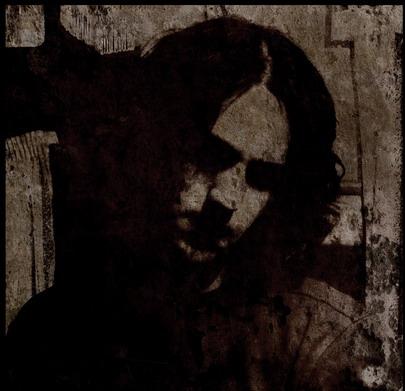
Ekove Efris a is one-man project from Tehran, Iran formed in 2001. Suicidal Rebirth, the first of their four albums, deals with the more conventional of depressive black-metal tropes: nature, death, sorrow and all other antonymous forms of happiness -yet the music isn't melodramatic, it doesn't writhe in it's overblown misery - the music is measured and varied and gives off a truly haunting and bittersweet atmosphere.
Ghostly and smoking through the mix are symphonic and folky textures riddled with traces of dark-ambient and trip-hop. It shares elements of ambient and depressive black-metal but also shares a doomy-reflectiveness akin to Saturnus - dream-like female vocals float through the album at times - and early Anathema; forlorn and gothic moments of melodic-doom filters through abrasive and vulnerable black metal. The two part 'An Elegy of Life, A Hymn to Death' - a dark and twisted dark-ambient journey - with a run length of 24-minutes ends Suicidal Rebirth; it's a varied and ambitious album that holds a unique atmosphere: part-Agalloch, part-Saturnus and part-Forogetten Tomb.
Saturday 5 March 2016
Alphabetical Discovery - Week E, Day One: Epidemic Control
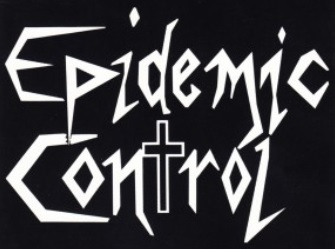
Today I thought I would actually discover something; whereas I've been posting bands that I know of well, or reasonably well, today I'm going to select the first random band beginning with e on Metal Archives and take it from there - in real time. This is partly because I have left this blogpost rather late in the day and do not want to break the promise I made to myself of posting every.single.day.
So here we have it, after about 15 randomisations the Swiss super-thrash-titans Epidemic Control have emerged from the burgundy realms of the archives. The band do not have an extensive discography; I am hoping it is quality over quantity here. 2000's Epidemic Control is the Swiss bands demo and their one and only release. Their logo is a sort of crossover between WordArt and sinister anti-religious propaganda: a truly evil combination of corporate greed and religious corruption. The band is made up of bass-wizard Fido, drum-gremlin Rola, guitarist and keyboard harlot Hausi and lead vocalist Roman: a Gaul. They have no links on their page to any music. No band photo. Nothing. Yet, by the song titles of their five-track demo, their music transcends sound - their aesthetic manages to plant their greatness through words and into my ears. Songs like 'Gott des Feuers' and 'mistery' - an anarchistic parody of mysteries - Epidemic Control were on the cusp of greatness. In all seriousness, I apologise for this completely half-arsed approach - maybe next time, if I do this again, I'll select a band that at least has music I can listen to, and at least one full-length. But in the meantime, feel free to bask in their imaginary music. Below is a radio Disney cover of Carcass's 'Corporal Jigsore Quandry'.
Friday 4 March 2016
Alphabetical Discovery - Week D, Day Seven: Diabolical Masquerade
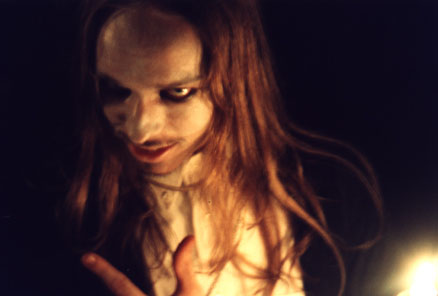
I stumbled upon Diabolical Masquerade when I was scouring the web for weird/avant-garde/experimental bands - bands that were quite literally a little bit made: Sigh, Kayo Dot, Transcending Bizzare? I found the album Death's Design in a list somewhere and gave it a listen. The album is made up of 61 songs broken up into twenty 'movements'. The entire concept of the album is based around it being the soundtrack for a fictional movie (once actually in the works, but soon dropped). I listened to it and wasn't sure what to think - it jumped around and sped ahead and I couldn't grasp it. It didn't help that some songs were six seconds long and that no lyrics were published. Black-metal passages melt into carnival-esque reveries into folk melodies into electronic video-game ambiance into smooth-jazz - it was fragmented and loose and I loved it. I didn't realise that the madhatter behind the band was Katatonia and Bloodbath guitarist Anders Nystrom alongisde Swedish ever-present ever-eclectic Dan Swano on drums.
I do not know the band very well outside of 2001's Death's Design, their fourth and final album. 1996's Ravensdusk In My Heart, their first album, is a more 'conventional' record although it still retains gothic, electronic and symphonic elements, although structured in less dramatic ways. Diabolical Masquerade's two albums in between remain a mystery to me, and that's exciting.
Thursday 3 March 2016
Alphabetical Discovery - Week D, Day Six: Desaster

Destructive and malevolent black-metal here. I'm going to use an irrelevant and rather pointless analogy: Desaster are black coffee, no sugar or milk - they're just pure black-metal in all its maniacal and evil glory. Desaster's approach takes a lot from the first and second-wave along with an occasional death-doom feel with vocals leaning towards Martin van Drunen levels of deadly heaviness and riffs edging towards old-school death-levels of gruesomeness. There's also the occasional call-back to a more traditional thrash sound; songs often transition from frantic and pummeling to mid-paced 80's-esque riffing. I don't know if the band mean to be so, but they are fun. The band take their name from a Destruction song, and the band, being German themselves, take a lot from the gravelly German thrash sound. Desaster have released seven full-lengths and each has been consistently excellent. Their last album, 2012's The Art of Destruction, is a monster of an album. The vocals are twisted and intense - just listen to the echo of them on 'Beyond Your Grace' - and there is a certain old-school mid-paced groove that runs through the violence. They have a new album - The Oath of an Iron Ritual - set for release on the 15th of April. If you're in need of some violent black'n'thrash listen to Desaster.
Wednesday 2 March 2016
Alphabetical Discovery - Week D, Day Five: Dodecahedron
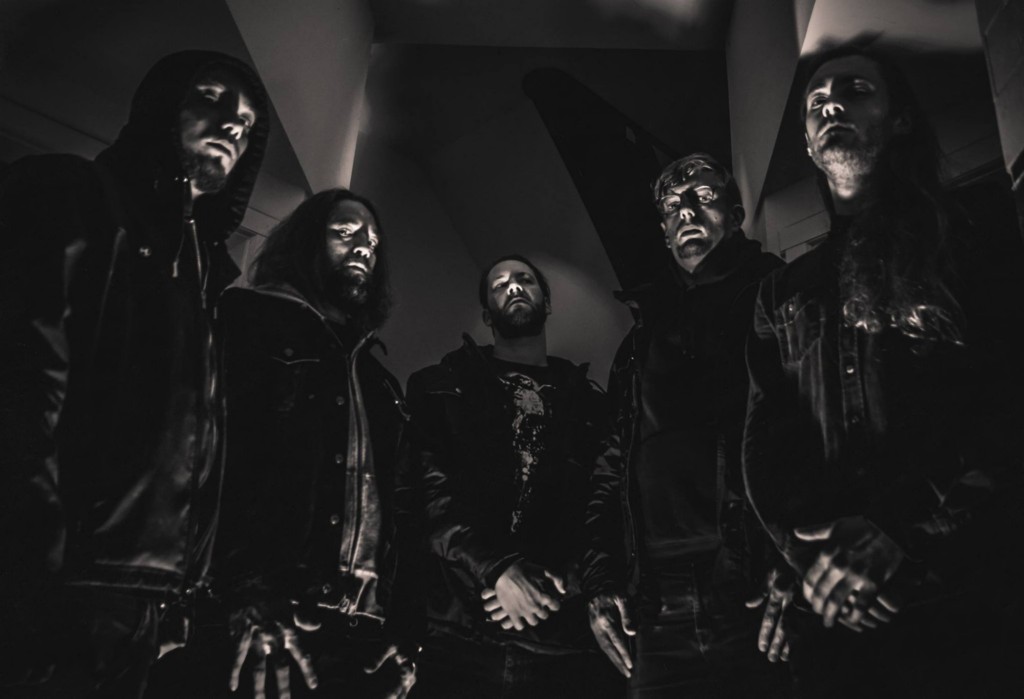
Netherland's Dodecahedron have only released one album, 2012's Dodecahedron - a debut album more well-thought out and interesting than bands that have grafted for years to release something a tenth as good. As their name suggests, Dodecahedron are sharp and angular and their core black-metal sound sharpened with harsh and disharmonious technical and progressive elements; disorienting time-changes merge with a machine-like and robotic space-age atmosphere: this is not raw at all, it's a pristine and glistening industrial assault of unorthodox proportions.
Although the music itself is jarring the album as a whole works extremely well; the three final tracks being a sort of trilogy - 'View From Hverfell 1, 2, and 3' - that the previous songs work towards. It really feels that way to, whereas the first half of the album is an industrial barrage of floating noises, discordant guitar progressions and pummeling drum-work, the second half seems to become less abrasive and more atmospheric, even conveying a melodic touch with the odd guitar-solo! The two halves, so to say, are linked by the robotic industrial-ambient 'Descending Jacob's Ladder', five-minutes of disquieting space-age atmosphere; it sounds like being haunted and chased by some demonic spirit, alone, in deep-space, on a creaking and malfunctioning space-station.
There is a consistent robotic and space-like ambiance to the album that works well with the sharp and angular approach - it is reminiscent of the French black-metal scene, Spektr and Deathspell Omega in particular, but it also reminds me of the atmospheric approaches of Colored Sands era Gorguts and Artificial Brain. Dodecahedron are a very excting band and, from their Facebook page, new music is in its advanced stages of gestation. In fact, the concept of the new album has been talked about - in an interview with Friedhof magazine, the band talks of the album revolving 'around the five geometric shapes called Platonic solids. These forms have been an inspiration for the songwriting process and will be represented musically on the album. That's all we can say right now!' It seems that the band will continue on their weird geometric black-metal journey!
Tuesday 1 March 2016
Alphabetical Discovery - Week D, Day Four: Drive Like Jehu

Each week I'd like to have an entry about a band that isn't necessarily 'metal' but these bands are the sort that I expect, or hope, metalheads will appreciate (well at least I do). Drive Like Jehu have been placed in the loose and rather fluid genre-box of post-hardcore; like post-metal, or post-rock, or post-black or post-whatever, the 'post' doesn't really help describe a sound much at all, in fact it's a rather lazy way of grouping bands that that are slightly left-of-centre or slightly off-kilter when compared to others.
Drive Like Jehu released two albums - 1991's Drive Like Jehu and 1994's Yank Crime - before disbanding a year later. 1994's Yank Crime is a noisy collision of piercing feedback and rusty noise - think a dirty Sonic Youth -, gruff shouted vocals and general off-key grit. This post-hardcore aesthetic, though, is only one piece of the album's dynamic puzzle - melodic and subtle interlocking guitar patterns and moments of textured space-rock slot in alongside the clangor of dissonant riffs that, as in end of 'Luau', sound on the verge of collapse, ringing and wailing like sirens - wires and computer systems locking-down and exploding. With four songs over seven-minutes (two over nine) and with most of the song-endings landing miles away from their blast-off points there is justification in applying the 'progressive' label to the band. But, most importantly, there is a raw energy that pulsates through the entire album; songs like 'Golden Brown', 'New Math' and 'Human Interest' are rip-roaring, throat-ripping, unhinged songs that can rival the intensity of gruffness of a lot of metal from the same time.
Monday 29 February 2016
Alphabetical Discovery - Week D, Day Three: Demolition Hammer
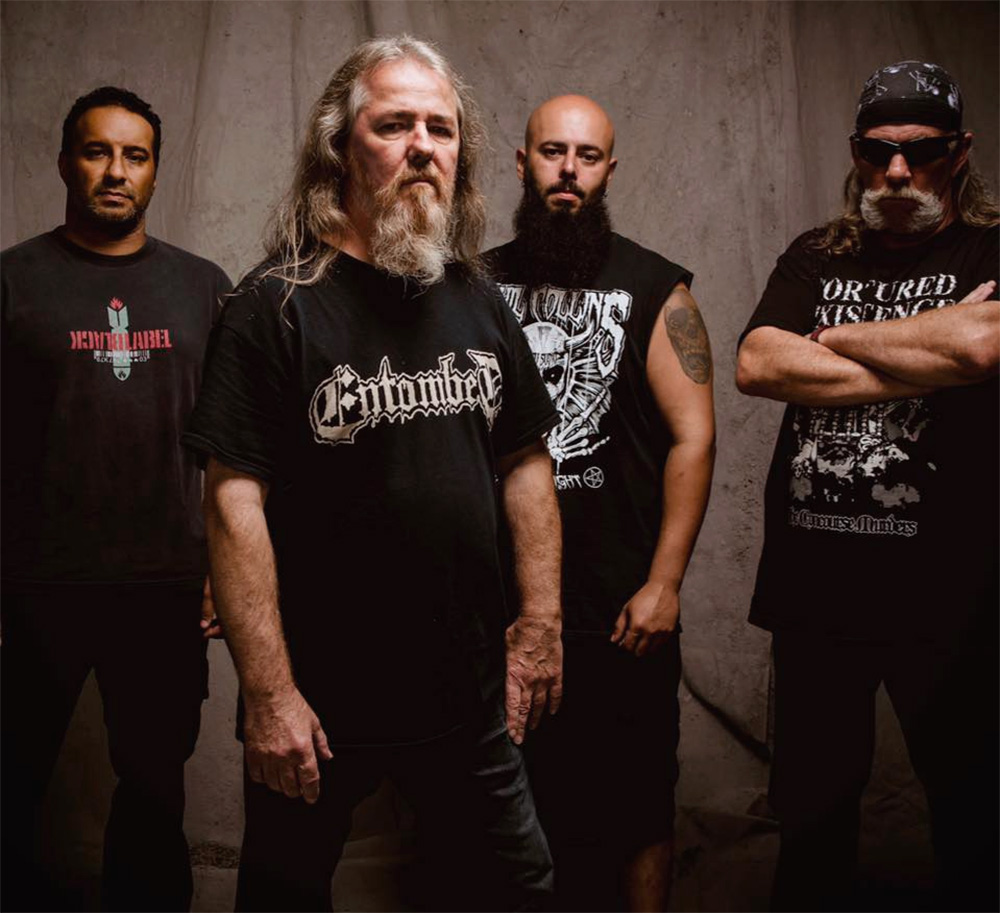
I wouldn't call Demolition Hammer criminally underrated because they're not. Like a lot of just-under-the-surface bands they haven't received the widespread attention - like the Bay Area bands or the Teutonic trio - but that's not to say they've been neglected. At a brief glance - at a time when Metallica and their friends had watered down their sound, at a time when Pantera shook off their glam-rags in favor of fuck-off biker-garb and at a time when Sepultura moved towards their nu-metal roots - perhaps the aggressive and pummeling thrash had lost steam and chugged to stagnancy. But, as there always is, bands like Demolition Hammer along with the likes of Morbid Saint, Exhorder, Dark Angel, Solstice, Sadus and many more, continued - even intensifying - the thrash sound that sent shock-waves through the 80's.
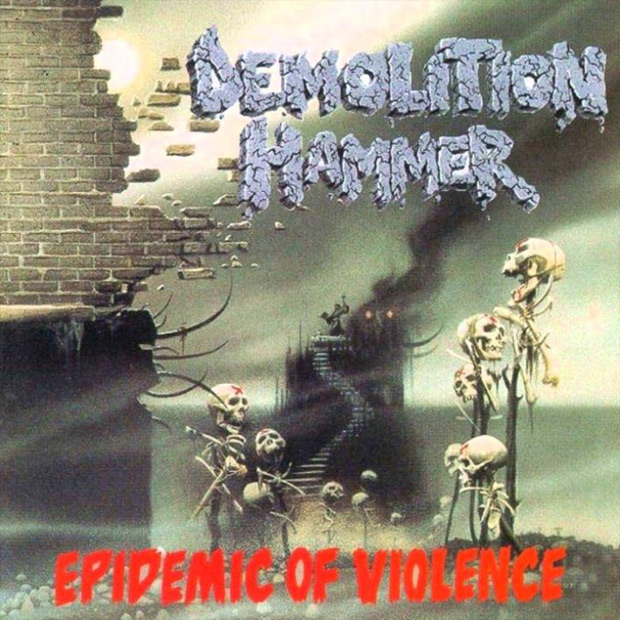
With three albums, 1990's Tortured Existence, 1992's Epidemic of Violence and 1994's (not so good) Time Bomb, Demolition Hammer - straight outta Com...The Bronx - steamrolled into the 90's turbocharged, leaving grunge and groove and arena-rock mediocrity in their wake, choking on the fumes. Their sound is thrash with the chunkiness of death-metal, a hybrid fueled by a complete fuck-off D.I.Y no-nonsense approach - their awful album artwork, a tradition in thrash, particularly good thrash for some reason, is testament to this. Epidemic of Violence, the best of the three, is one of the most headbang-able albums, with mostly throttling riffs mixed up with the occasional death-metal chug and mid to fast-paced groove. Lyrically it also leans more towards the gory and ultra-violent, more Carcass and Autopsy than Metallica.
The vocals are, as screamed in 'Skull Fracturing Nightmare', gruesome tools of torture; once again the death-metal hybrid is brought to the fore, the vocals inherently more gruesome and nasty. The drumming is just one of the great things about this album; Vinny Daze's (who died in 1996 after being poisoned by a globefish - I presume after eating one - after attending a tattoo convention in Japan) drumming is a frenzied and unmerciful assault that never lets up. The solos are also great and I like that they retain a certain melody rather than spiraling into noisy wailing (Slayer). I don't know why I keep comparing them with Carcass, but the solos have a much more thrashy Bill Steer-esque quality in my opinion, which is a great thing. Most importantly, Demolition Hammer had an intensity, aggression and mad energy that the best thrash bands had in abundance.
Sunday 28 February 2016
Alphabetical Discovery - Week D, Day Two: Darkspace
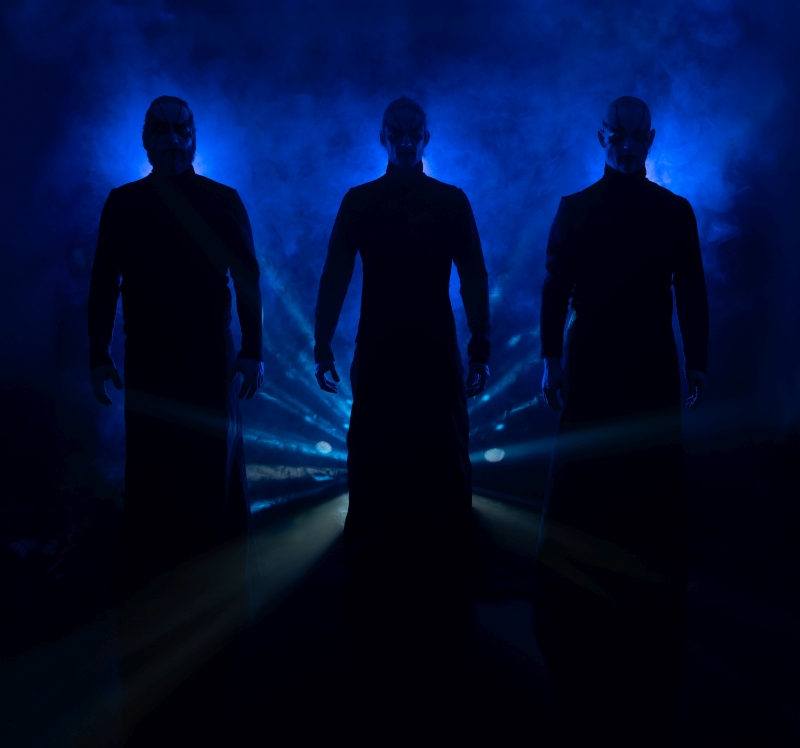
In space no one can hear you scream but Darkspace belong to a more terrifying galaxy, a dark space that moans and creaks for light years in all directions. Their music deals with space, the cosmic void, and the mystical mysteries of the vast dark universe. Their music is dense and smothering and incessant, a neutron star crushing inwards. Formed in 1999 in Switzerland by Wrothe of Paysage d'Hiver and Zhaaral of Sun of the Blind, they've released four full-lengths - the equally ambiguous Darkspace 1, Darkspace II, Darkspace III and Darkspace III I. Everything about their sound seeps darkness.
The keyboard ambiance is key to their cinematic sound and the movie sample of Hal 9000 from 2010 in '1.1' intensifies the atmosphere that is created throughout their first album and the three albums - pretty much direct continuations - that follow. Darkspace are a difficult band and there isn't a vast amount of differentiation or jarring change in their sound; their music is purposely incessant and repetitive, yet there are subtleties in most songs that, although maybe hard to notice, are captivating - from a change in tone or key of the keyboard to a slight riff-change, from moments of completely suffocating noise to airy transitions into ambient dark-wave. I suppose it's the ambient black-metal equivalent of funeral doom yet there are more than a fair share of great riffs - from the expected black-metal tremolo riffing to blocks and chugs of reverberating noise. Their music really rewards close listening. It does ask a lot of its listeners but their music creates a stifling atmosphere like no other.
Saturday 27 February 2016
Alphabetical Discovery - Week D, Day One: Demilich

Finland's Demilich formed in 1990, releasing only one full-length, 1993's Nespithe, before breaking up and fading into the swampy coldness of the Finnish landscape. Finland produced some rather unnerving and left-of-centre death-metal bands in the 90's - the likes of Demigod, Adramelech, Convulse, Funebre, Abhorrence, Depravity and many more meshing technical flavorings with razor-sharp old-school death and abhorrent and often weird morbid themes.
Spasmodic, rhythmically irregular, jarring with gurgled vocals tremble beneath the music like something slimy disfigured creature from the deep, Demilich were truly an anomaly. There's a bizarre angularity to their sound that sounds genuinely alien - a slimy, crushing, pulsating approach oozing eccentricity. Masked underneath this unearthly multi-dimensional monstrosity are flecks of muddy old-school death-metal - the occasional dissonant solo and spurts of intense blasts and quick fire riffs and melodies. Nespithe doesn't shy away from melody either, although the melodies travel through more unconventional wires. The jarring rhythmical approach resulted in some of the most mesmeric riffs and repetitions I've heard - every songs seems to share a particular thread or pattern that runs from the beginning through to the end, the album has an incredibly satisfying flow.
Conceptually, the album artwork and lyrics are a perfect extension of their sound - with hyper-detailed song titles like 'The Planet That Once Used to Absorb Flesh in Order to Achieve Divinity and Immortality (Suffocated to the Flesh That It Desired...)' and 'The Sixteenth Six-Tooth Son of Fourteen Four-Regional Dimensions (Still Unnamed)' and 'The Putrefying Road in the Nineteenth Extremity (...Somewhere Inside the Bowels of Endlessness...)' basic cavemen-death grooves and themes are nowhere to be seen or heard in this ultra-weird vomit-infested sun-crushing alternate universe.
Nespithe is one of the albums I can listen to over and over again and never get tired, there's always something odd - be it a stray bass-line, a partiular riff-pattern, or a particular noise that rises from the tangled 'fourteen four-regional dimensions' - that hooks me in. Part of Demilich's cult status is gathered from how they faded away right after Nespithe; they're touring again now and I'm sure their shows would be incredible.
Friday 26 February 2016
Alphabetical Discovery - Week C, Day Seven: Converge

Converge belong to the true sect of metalcore with bands like Earth Crisis, Botch, Coalesce, Zao, The Chariot taking direct influence from the gritty violence of hardcore and punk and the complex heaviness of extreme metal. Chaotic, complex and most importantly heavy, Converge are definitely metal. There is more than a fair selection of completely overpowering grind, crust, black and thrash-metal moments - guitarist Kurt Ballou described their first album, 1994's Halo In A Haystack, as 'a bunch of hardcore kids playing leftover Slayer riffs' - to attract even the purist of extreme-metal fans.
I'd describe them as Pig Destroyers hyper-active, higher-pitched, supersonic twin (they released a split with Scott Hull’s Agoprahobic Nosebleed, incidentally). Converge's music from the early 1990's up to 2001's Jane Doe is a relentlessly sharp attack of shredding shrieks, intense tempo-changes and progressions, chaotic riffs and incredible drum work. Ben Koller's drumming is some of the best you'll hear, an unrelenting force of nature. Their third album, 1998’s When Forever Comes Crashing, is my particular favourite: a melting-pot of chaotic hardcore, mathcore, and thrash with slabs of industrial noise. 2001's Jane Doe is their pinnacle - a skin-shredding 45-minute assault that also experimented with suffocating industrial and doom-like sections. Converge are probably one of the most energetic and visceral bands, but their approach, particularly from Jane Doe onwards, is not purely an all-out assault - there are many moments and songs that morph and change from chaos to slow and sludgy, trance-inducing doom in the vein of Godflesh and more contemporary bands bands like Indian and Thou ('The Lowest Common Denominator' is a good example of this). There is a great diversity to their sound and pigeon-holing the band doesn’t do them justice.
I wouldn't say that black-metal is a direct influence on the band, or something that has been purposely utilised in their music, but their sound is an intensification of hardcore, punk and - to a certain extent - speed and thrash, four styles that were partly merged to form the evil atmospheric sounds of the first and second-wave black-metal bands. I'm sure that if Converge really wanted to be a black-metal band they'd be a very good one, but their sound is closer to the US hardcore-punk scene of the 80's and 90's.
So many bands get derivatively labelled and grouped as being one thing, although Converge have managed to break out of the derogative metalcore/mathcore rubbish heap. Often – in metal circles - people who speak of metalcore, or hardcore even, are shunned from the circle as lepers are from the populace. Perhaps such repulsion is partly to do with the fan base that these ‘genres’ attract, but there really are some great bands with great riffs and a great sound buried beneath watered-down bands like Killswitch Engage and Hatebreed. I’m going to stop here because I’m just ranting about things that have been said over and over again for years. Converge are good.
I'd describe them as Pig Destroyers hyper-active, higher-pitched, supersonic twin (they released a split with Scott Hull’s Agoprahobic Nosebleed, incidentally). Converge's music from the early 1990's up to 2001's Jane Doe is a relentlessly sharp attack of shredding shrieks, intense tempo-changes and progressions, chaotic riffs and incredible drum work. Ben Koller's drumming is some of the best you'll hear, an unrelenting force of nature. Their third album, 1998’s When Forever Comes Crashing, is my particular favourite: a melting-pot of chaotic hardcore, mathcore, and thrash with slabs of industrial noise. 2001's Jane Doe is their pinnacle - a skin-shredding 45-minute assault that also experimented with suffocating industrial and doom-like sections. Converge are probably one of the most energetic and visceral bands, but their approach, particularly from Jane Doe onwards, is not purely an all-out assault - there are many moments and songs that morph and change from chaos to slow and sludgy, trance-inducing doom in the vein of Godflesh and more contemporary bands bands like Indian and Thou ('The Lowest Common Denominator' is a good example of this). There is a great diversity to their sound and pigeon-holing the band doesn’t do them justice.
I wouldn't say that black-metal is a direct influence on the band, or something that has been purposely utilised in their music, but their sound is an intensification of hardcore, punk and - to a certain extent - speed and thrash, four styles that were partly merged to form the evil atmospheric sounds of the first and second-wave black-metal bands. I'm sure that if Converge really wanted to be a black-metal band they'd be a very good one, but their sound is closer to the US hardcore-punk scene of the 80's and 90's.
So many bands get derivatively labelled and grouped as being one thing, although Converge have managed to break out of the derogative metalcore/mathcore rubbish heap. Often – in metal circles - people who speak of metalcore, or hardcore even, are shunned from the circle as lepers are from the populace. Perhaps such repulsion is partly to do with the fan base that these ‘genres’ attract, but there really are some great bands with great riffs and a great sound buried beneath watered-down bands like Killswitch Engage and Hatebreed. I’m going to stop here because I’m just ranting about things that have been said over and over again for years. Converge are good.
Thursday 25 February 2016
Alphabetical Discovery - Week C, Day Six: Cryptopsy

I'm just going to jump right in and talk about None So Vile, Cryptopsy's second - and best - album, and arguably one of the best extreme metal albums. Many bands have attempted to perfect that art of the unruly, the schizophrenic, the chaotic, but none come close to the 32-minutes of complete and utter freakishness that 1996's None So Vile manages to ooze.
None So Vile opens with a roaring demon dinosaur type creature welcoming us into the mad-world; indecipherable lyrics - including a notable selection of references to anal play - and inhuman vocals layered above rapid drumming and unstable guitar sounds that happen to contain both a brain-numbing difficulty and an incredible level of groove. There is so much groove invisible behind the cacophony as in 'Grave of the Fathers' for example. This is unconventional brutal-death, the parameters of straight-forward death turned on its head, floating in a bizarre space defying gravity and the laws of conventional music. This is all incredibly dramatic and hyperbolic but I think a cautious approach does the album no justice whatsoever - sometimes you have to go a bit crazy.

Lord Worm's vocals are made up of some of the most disgusting sounds known to man: diseased and frothing gargles, spewing gurgles, razor sharp snarls, excruciatingly painful groans, piggish snorts, heart-wrenching shrieks, cannibalistic growls - not many other vocalists touch the complete madness of his vocals; they are unstructured and loose, but this unruliness is more of selling-point than a weakness. The vocals are like the cries at an exorcism, some brutal demon pouring from the portal of the throat; this is how the closing sections of 'Benedictine Convulsions sounds. Lord Worm now teaches English - those poor children.
Combining and controlling all of this chaotic unruliness must be a difficult task, yet there is a cohesive unstructured structure to the album; there are immensely good riffs that never linger too long, that always mutate and move on to the next - the band must have sold their soul to the devil for a bottomless pit of riffs because almost every transition is mesmeric. This is attenuated by the maniacal drumming of Flo Mounier - it's difficult to really put my finger on what it is so I'm just going to be completely hyperbolic about describing this too: it's a multi-dimensional, warped, multi-armed piston-heavy explosion of blast-beats, hat-riding, and bellowing rhythmic annihilation. It's an acquired sound; the snare is pronounced, at times sounding hollow, but it works with the album, it's purposely not meant to sound clean or fluid.
The bass is the same; it's played with the panache of a classical or flamenco guitarist - fingers and bass strings stomping and swinging about with such incredible energy. It doesn't really sound like a bass - it transcends the boundaries of sound, curving and warping as the waves tumble through the air. There are also moments of beauty and semi-conventionality carried through brief solos and spurts of rhythm - 'Slit Your Guts' is an example of this.
Cryptopsy's first album Blasphemy Made Flesh has a much grittier production, it perhaps does not contain the overly-spasmodic tendencies of None So Vile but from an outsiders it's just as unconventional; the bass seems to ping with even greater clearness due to the production on Blasphemy Made Flesh, the vocals are maniacal if slightly more conventional and the drum-work once again pummeling. Their third album, Whisper Supermacy, is also worth checking out despite no Lord Worm on vocals, the instrumentals are still mind-boggling. After that album my knowledge is a bit more hazy - there was that one album that shall not be named. Their 2015 E,P The Book of Suffering was actually decent, but it lacked something, it dropped pretty quickly onto the ever moving conveyor belt of good but not incredible music.
Subscribe to:
Posts (Atom)


